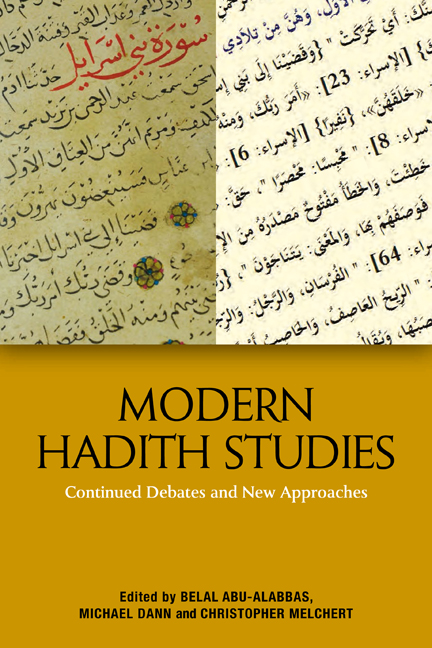Book contents
- Frontmatter
- Contents
- Figures and Tables
- Acknowledgements
- Note on Conventions
- Notes on Contributors
- Introduction
- 1 Kunnā nakrahu al-kitāb: Scripture, Transmission of Knowledge, and Politics in the Second Century AH (719–816 ce)
- 2 The History of the Adhān: a View from the Hadith Literature
- 3 Ibn al-Mubārak, Traditionist
- 4 Early ‘Traditionist Sufis’: A Network Analysis
- 5 The Common Link and its Relation to Hadith Terminology
- 6 Hadith Criticism between Traditionists and Jurisprudents
- 7 Hadith Criticism in the Levant in the Twentieth Century: From ẓāhir al-isnād to ʿilal al-ḥadīth
- 8 The Reception and Representation of Western Hadith Studies in Turkish Academe
- 9 Can Different Questions Yield the Same Answers? Islamic and Western Scholarship on Shiʿi Narrators in the Sunni Tradition
- Index
6 - Hadith Criticism between Traditionists and Jurisprudents
Published online by Cambridge University Press: 01 October 2020
- Frontmatter
- Contents
- Figures and Tables
- Acknowledgements
- Note on Conventions
- Notes on Contributors
- Introduction
- 1 Kunnā nakrahu al-kitāb: Scripture, Transmission of Knowledge, and Politics in the Second Century AH (719–816 ce)
- 2 The History of the Adhān: a View from the Hadith Literature
- 3 Ibn al-Mubārak, Traditionist
- 4 Early ‘Traditionist Sufis’: A Network Analysis
- 5 The Common Link and its Relation to Hadith Terminology
- 6 Hadith Criticism between Traditionists and Jurisprudents
- 7 Hadith Criticism in the Levant in the Twentieth Century: From ẓāhir al-isnād to ʿilal al-ḥadīth
- 8 The Reception and Representation of Western Hadith Studies in Turkish Academe
- 9 Can Different Questions Yield the Same Answers? Islamic and Western Scholarship on Shiʿi Narrators in the Sunni Tradition
- Index
Summary
Western scholarship on the methods developed by Muslim critics for evaluating the authenticity of hadith reports have focused predominantly on isnād criticism as opposed to matn criticism. Through the mediating influence of Muslim modernists, the question of matn criticism in classical hadith scholarship and its sufficiency or lack thereof became a hotly debated topic in Muslim scholarship over the course of the twentieth century, and served as an important proxy for the broader question of the extent to which the Islamic tradition may or may not need far-reaching internal reform. Advocates of sweeping reform have pointed to the lack of matn criticism as an instance of the fideism and irrationality of the traditional ʿulamāʾ, while defenders of tradition have sought to prove that hadith critics did in fact apply matn criticism in their evaluation of hadith reports. Efforts to substantiate the pedigree of matn criticism have often focused on the criteria for matn criticism (ʿalāmāt waḍʿ al-ḥadīth) found in post-formative manuals on ʿulūm al-ḥadīth and on the different chapters related to matn in these manuals. Other works have focused on the applications of matn criticism through a smattering of examples drawn from the generation of the Companions themselves and on forged hadith literature, especially the works of Ibn al-Jawzī (d. 597/1201) and Ibn Qayyim al-Jawzīyah (d. 751/1350).
Less attention has been given in Western scholarship to hadith criticism in the literature of jurisprudence (uṣūl al-fiqh). This chapter will present a comparative analysis of the theory and practice of matn criticism between traditionists (muḥaddithūn) and jurisprudents (uṣūlīyūn). When viewed from this comparative perspective, a number of new questions concerning matn criticism arise. What, precisely, was the nature of matn criticism among these two groups and to what extent, if at all, did their approaches overlap? In what ways did matn criticism differ across legal schools? In what ways was the approach to matn criticism among the adherents of some legal schools closer to that of hadith critics than it was among adherents of others? How was the practice of matn criticism shaped by the epistemological frameworks and overall aims of the separate disciplines of hadith and jurisprudence?
- Type
- Chapter
- Information
- Modern Hadith StudiesContinuing Debates and New Approaches, pp. 129 - 150Publisher: Edinburgh University PressPrint publication year: 2020

